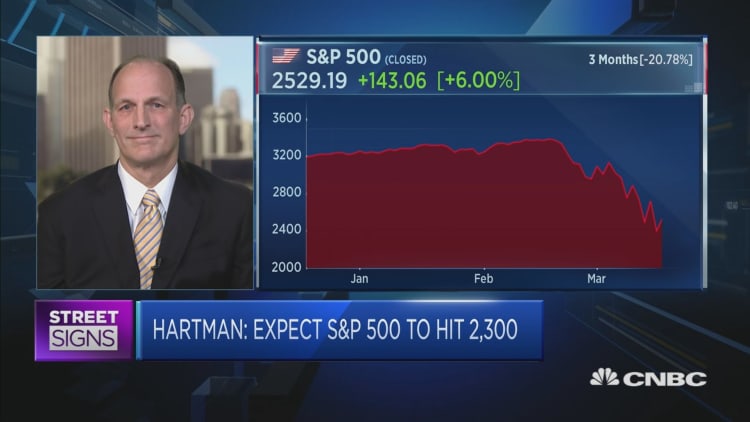In the age of coronavirus, cash is indeed king.
That's the view, at least, of many major investors, who are selling everything from stocks to bonds to gold in order to raise cash.
Bank of America Merrill Lynch in its March Fund Managers' Survey indicated that month over month, cash among funds has seen the 4th largest monthly jump in the survey's history, from 4 percent to 5.1 percent. Like buy-side fund managers, sell-side advisors also feel the need to be conservative, waiting on the sidelines for the market selloff to settle.
Jonathan Pain of the Pain Report markets newsletter, who called the selloff on February 24, told CNBC on Monday that he is seeing "a mad rush for cash." The spike in bond yields, with 10-year rising above 1.2% and the 30-year more than doubling in the last few days, marks only the latest way that the typical correlations between assets are breaking down.
"Whatever number you have got, double it. If you are at 10 percent (cash), make it 20 percent."Gary DuganCEO, Purple Asset Management
Gold, a classic "safe" asset, has seen wild swings between $1,450 and $1,550 an ounce, triggering panic selloff by traders looking to liquidate everything they have in order to honor large market positions on borrowed money. Essentially, they need to generate cash to pay for the over-exposed calls that have generated losses.
The big problem for world markets right now is that there just aren't enough dollars to go around.
That's one reason the greenback just crossed the 101.45 mark against a basket of currencies, despite the Fed funds rate going down to near zero. Divya Devesh, Asia foreign exchange strategist at Standard Chartered, told CNBC's "Street Signs" on Wednesday that even though the Fed has rolled out a $700 billion asset purchase program, the bond market doesn't foresee inflation rising.
Inflation risk is off the table because of the unprecedented crash in oil prices.
The traditional inverse relationship between bonds and stocks has broken in the ongoing selloff. Morgan Stanley in a research note pointed out that the less power bonds have as a hedge for a portfolio, the less overall risk a portfolio should take.
In summary, bonds can no longer cushion portfolios in bear markets where stocks are seeing clear capitulation.

Speaking about desirable cash levels, Gary Dugan, CEO of Purple Asset Management didn't mince his words when he spoke to CNBC on Monday: "Whatever number you have got, double it. If you are at 10 percent, make it 20 percent."
Cash is king not only for investors, but also for businesses. Looking for companies that have strong balance sheets, less debt, stable cash flows and carrying a respectable dividend yield are the preferred plays.
Some fund managers, such as Sat Duhra from Janus Henderson, believe the most attractive sectors in Asia are REITs, telecom and infrastructure assets. "These sectors remain favored in times of extreme volatility and sharp market draw-downs, given their defensive nature," he said.
Not everyone is pro-cash
All that said, there certainly are a lot of contrarian bets out there.
Other assets that are drawing investor interest include China A-shares. The Chinese yuan — both offshore and onshore — is also gaining investors.
Some analysts say outright that they don't feel cash is such a great idea.
"Raising cash when the S&P 500 is already off 28 percent from its peak doesn't seem the most appropriate strategy now," Kelvin Tay, regional chief investment officer of UBS Global Wealth Management, told CNBC via email. "Since 1945, the average drawdown in bear markets has been 34.5%."
Applying that calculation to today's markets would imply the S&P 500 index bottoming out at around 2,200 — or another 8 percent from current levels. But no one can be certain, of course. Trying to time the market and buy at the bottom is not a viable strategy when the closely followed volatility index from the Chicago Board Options Exchange, the VIX, is at record highs.
Kelvin said he believes the opportunities could lie in the tech sector — online companies, e-commerce giants, 5G companies and cloud computing firms could be winners in a further market retreat.
That would be a "smarter" strategy, he said, than raising cash.



